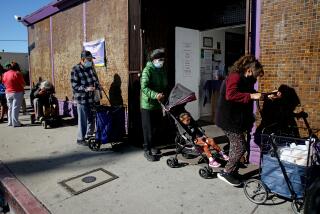Opinion: What L.A. could do today — as in right now — to house thousands of homeless people
- Share via
To the editor: Philip Alston, the United Nations special rapporteur for extreme poverty and human rights who recently toured Los Angeles’ skid row, really got to the heart of the matter: We have the money to eradicate homelessness, but we do not have the political will. (“U.N. monitor says L.A. lags behind other cities in attacking homelessness,” Dec. 15)
The recent passage of Propositions HHH and H shows the will of local taxpayers to solve the homelessness problem. Unfortunately, building 10,000 units for homeless people in 10 years is too slow a process to make a dent in this problem anytime soon. Right now, we are building about 300 units per year.
What we need is the rapid building of tent cities or Quonset huts to provide cover, beds, toilets, washing machines and services to the thousands of homeless on our streets, starting with skid row. These people need a sanctuary where they can bring a pet and a significant other.
Let this U.N. report spur city and county officials to make vacant spaces available to address this problem in the short term. We believe Los Angeles has the will to make this happen.
Sandra Trutt and Martha Sklar, Los Angeles
Trutt chairs the Homeless Action Committee of the League of Women Voters of Los Angeles, and Sklar is the group’s president.
..
To the editor: Basic to all humans is urination and defecation, preferably in a private setting. Yet in downtown Los Angeles if you are homeless or just in immediate need, there are few facilities for relief.
The term “open defecation” bandied about by those working in poorer, less-developed countries presents the public health challenge to those toiling to reduce the spread of gastrointestinal diseases. With few public toilets, open defecation also becomes a problem in downtown Los Angeles, despite our wealth as California’s largest city.
During his recent fact-finding mission on extreme poverty and human rights, Alston told of legal and economic consequences beyond public health faced by the homeless when public toilets are not provided, including a cycle of “ever more demanding and intrusive regulations” that eventually lead to “the stigma of a criminal conviction which virtually prevents subsequent employment and access to most housing.”
While poverty and homelessness require considerable resources to ameliorate, the smaller goal of making available more public toilets downtown both aids public health and offers basic dignity to those living in the shadows.
Ralph R. Frerichs, Sierra Madre
The writer is a professor emeritus of epidemiology at UCLA.
..
To the editor: The verdict is in: The government helped create the housing and homelessness crisis, and now it uses criminalization of the poor to conceal it.
Moreover, the city and county of Los Angeles have the financial resources to end the crisis locally, but not the will to do it. Thus, thousands are camped in the streets with nowhere to go. This is shameful and criminal because people are dying in the streets.
Our officials can do something immediately by opening up county and city properties for housing, shelters and encampments, with services at each site.
Mary Ann Curtis, Los Angeles
Follow the Opinion section on Twitter @latimesopinion and Facebook
More to Read
A cure for the common opinion
Get thought-provoking perspectives with our weekly newsletter.
You may occasionally receive promotional content from the Los Angeles Times.






